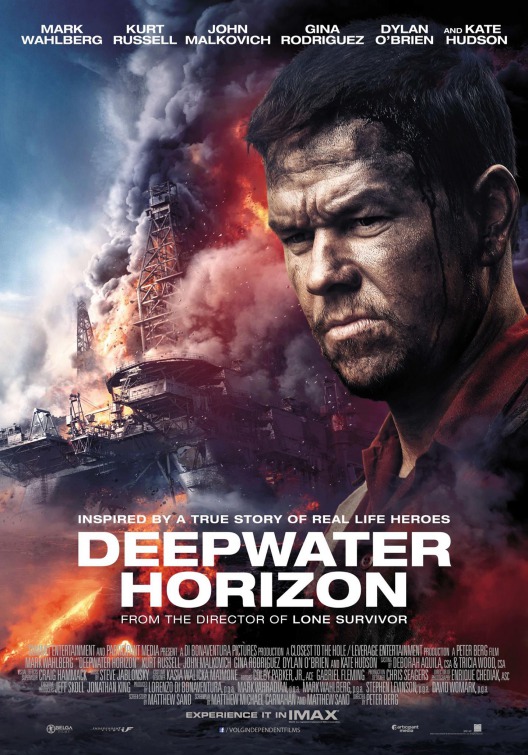 The true disaster story of the 2010 explosion and destruction of the offshore oil rig Deepwater Horizon, that became the largest man-made disaster in history.
The true disaster story of the 2010 explosion and destruction of the offshore oil rig Deepwater Horizon, that became the largest man-made disaster in history.
Watching the first third of Deepwater Horizon was like watching The Big Short or Wall Street. After a brief introduction to the protagonist, Mike Williams, played by Mark Wahlberg, and one other female character, we are plunged into the politics aboard the semi-submersible oil rig, famous for its safety awards, but now facing the mounting pressure of corporate executives trying to skirt safety regulations on a delayed project versus the safety concerns of rig chief, Jimmy Williams, played by Kurt Russell.
Insider lingo and tech talk fills the screen in such a way that the viewer cannot quite understand, making him feel immersed in an authentic environment, but not so detached as to be unable to interpret the emotions and tense human drama that are occurring.
Tension mounts with rising concern under the direction of Peter Berg, a fine visual director of past films like the phenomenal Lone Survivor.
When the series of explosions begin that will utterly destroy the rig and ultimately kill eleven of the workers onboard, the movie becomes a non-stop, white-knuckle ride of terrifying real life disaster, accompanied by acts of heroism, as Mike and other workers pull together to save as many people as possible.
I’ll admit it, I am a sucker for true stories of heroism because they move me, they inspire me, and they give me hope that men and women can pull together in crisis for the better part of our humanity. That’s the second best kind of transcendence in a story that makes it worthy.
So I thoroughly enjoyed the adventure and the human will to survive. We need more of these movies to counter the nihilism and cynicism that permeates our culture.
Godawa’s Quibble Corner
What did not inspire me was the very thin development of character, not merely of the protagonist, but of all of the characters. There were no significant personal internal journeys that would have created a much more human interest story. It amounted to an explosively well-filmed disaster survival documentary with two dimensional characters. I longed for the kind of transcendence that movies like these can attain, if they only seek the deeper meaning that is waiting to be discovered embodied in the event.
One particular moment at the end of the film was like a loud backfire of missed opportunity. After most of the men are aboard the rescue ship, and the proper villain is shamed, all the men kneel down and pray the Lord’s Prayer together. But there is nothing prior in the movie that would set up for this otherwise moving scene. What a powerful spiritual potential to a story that was never set-up to be released with real impact. Patronizing instead of inspirational as it could have been.
Well, counter that with the pleasant surprise that the end credits did not blame the big bad oil companies involved with causing global warming, and my respect for Berg just rose several notches. It’s gotta be difficult to keep insane Hollywood politics out of your movie, and that’s about as heroic as you can get in my book.
